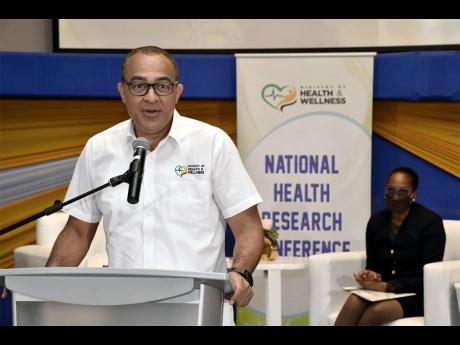Jamaican researchers to get $50m injection
The $50 million that the Government previously set aside pre-COVID for a Wellness Research Fund will soon be disbursed to Jamaicans to execute public-health research.
Dr Christopher Tufton, minister of health and wellness, made the announcement Wednesday during his address at the opening ceremony for the National Health Research Conference.
The event was held at the AC Hotel in Kingston.
Tufton did not give a timeline for disbursement but said the funds would be “distributed very soon”.
The minister said that the pandemic had put a dent in its disbursement plans.
The $50 million is drawn from the National Health Fund, Tufton said, adding that there are efforts to encourage research to solve problems.
“I’m hoping that we can put up another $50 million as soon as possible. I would have wanted to see it done annually so that we continue to stimulate the space so that persons are encouraged to do research,” Tufton said.
The research will focus on wellness in workplaces, schools, homes, communities, and among persons with non-communicable diseases and risk factors.
These risk factors include sedentarism, unhealthy diet, tobacco use, harmful use of alcohol, and air quality.
The fund is in support of the Wellness Agenda previously announced by Tufton during his Sectoral Debate presentation in 2019.
At the National Health Research Conference, Tufton had words of encouragement for researchers and those interested in accessing financing for such work.
“As you embark on defining your research agenda, you give some consideration to the change that needs to take place, not just the quality of the research or the fact that the research is done, but how is the research used as an instrument of change because that really is our significant challenge as a people, as a country, and indeed, I say, as a world,” Tufton said.
He also stressed that Jamaicans produce applied research and not just work that would win top awards and be placed in journals.
“Yes, you may get the accolades from it, but how much impact does it have on the ground in the community? How does it change the lifestyle of an individual?
“How does it change the health-seeking habits of our young people in schools? How does it influence them desiring water as opposed to sugary drink?” he asked.
Tufton also stressed that researchers must seek to become innovative.
That would require a new approach to advocacy in taking research from the lab into the streets, the minister said.
“How do you break it down from clinical terminologies to everyday language that the average man can understand? How do you prove your detractors wrong even when they are bold and they are spending a lot to carry their particular line?” he said.
At the National Health Research Conference, Tufton also expressed concern that the NCD crisis was worsening.

